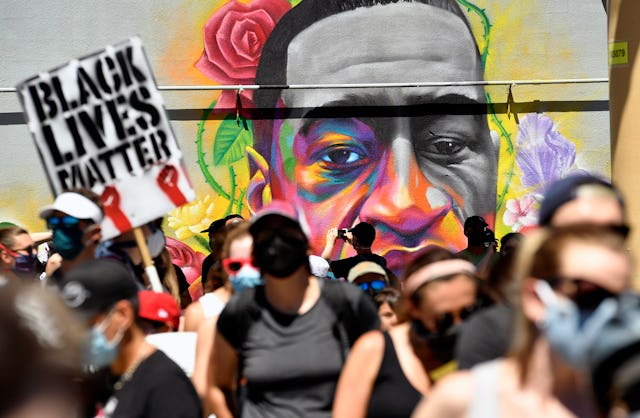I Won’t Let My White Sons Forget George Floyd
This is my lifelong responsibility.

Like many parents, I often experience anxiety and despair over the cruelty of the world I’ve brought my children into. So what are we to do? I spent years as a journalist covering racial and economic inequities in schools but, when I traded my career for caregiving, my only power to raise consciousness was in my own home. My sons were just 4 and 6 when a white police officer killed George Floyd two years ago, but I did not spare them the details.
We looked at pictures of his daughter, Gianna, who is the same age as my older son. We later watched officer Derek Chauvin’s conviction live and read articles about the culpability of the other three officers.
This is a paradox in my parenting: My husband and I vet every television show and movie our sons consume for age appropriateness, and I’m relentless in screening for violence for entertainment purposes. Now 6 and 8, they are still unaware of most swear words; we’ve skirted around the particulars of sex. I didn’t talk about the war in Ukraine for two weeks after the invasion began. In contrast, I’ve initiated conversations about slavery and the Civil Rights Movement through books and videos since the boys were toddlers. Why? Racist systems endure because of complacency over generations. This is why I won’t let my sons forget George Floyd.
In the aftermath of the Floyd murder, many white parents spoke to their kids about racism for the first time. Black parents, on the other hand, have likely spoken often about the need to deliver “the talk” and the sad reality that they need to have it repeatedly. Inequities that often fall along racial and economic lines begin with prenatal care, parental leave policies and early childhood education, when young brains are developing most rapidly. By the time elementary school begins, the gulf in opportunities is already daunting.
In the book How To Raise Kids Who Aren’t Assholes, author Melinda Wenner Moyer cites several studies showing that when white parents try to raise children as colorblind, the strategy backfires and kids develop racial bias trying to make sense of the world they see. It is important, instead, to discuss these issues directly; white children also need exposure to diverse environments and opportunities to develop interracial friendships. The book suggests that white parents educate themselves about racism and confront their own prejudices, too. All of us, parents and kids, will mess up here.
And I won’t pretend it’s not hard watching my sons ingest painful truths, processing concepts like suicide while reading a passage about Africans jumping off slave ships in Born on the Water, The 1619 Project’s book to explain slavery to children.
Among my younger son’s questions as a 4-year-old in the spring of 2020: “When the not-polite police officer’s knee was on George Floyd’s neck, was the blood still flowing through his body until it stopped?” He wanted to know who lived a fuller life, Mr. Floyd or my mother, who died of cancer at age 66. I said my mom did not have as full a life as we would have liked, but she lived 20 years longer than Mr. Floyd with far fewer struggles, and at least we had a chance to say goodbye to her. He worried about how the police would treat a Black boy in his preschool class.
The details of this month’s racist massacre at a Buffalo supermarket are so horrible, I struggle to ingest them all myself.
As my white boys grow into white men, how do I help them recognize in all people both our shared humanity and the opportunity to learn from differences? How do I help them to see their privilege — race, class and gender — as a responsibility? In moments of despair, I recommit to learning, working through my own discomfort, and intentional everyday efforts. It’s part of a lifelong responsibility as a white parent to teach my children to take a stand.
Sara Pam Neufeld, a writer and yoga teacher in Queens, is working on a memoir. Her Instagram is @sarapamneufeld. For resources about how to teach children about racism, visit www.learningforjustice.org.